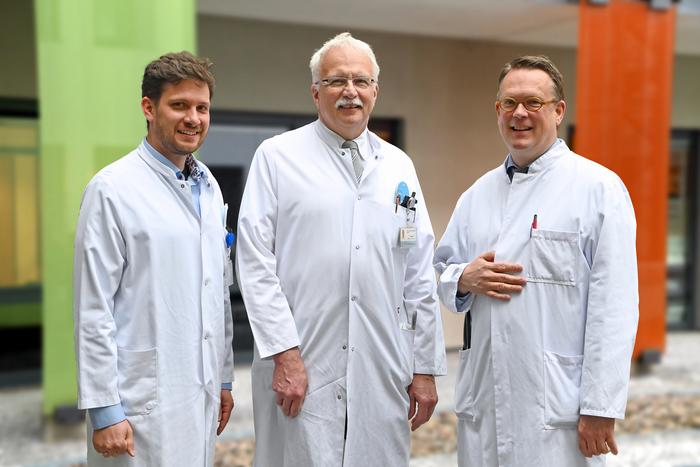
A groundbreaking advancement in the treatment of severe autoimmune neuropathies has been achieved by a dedicated team of physicians from Ruhr-University Bochum, Germany. For the first time in clinical history, Chimeric Antigen Receptor (CAR) T-cell therapy—a form of immunotherapy traditionally reserved for hematologic cancers—has been successfully employed to treat patients suffering from a rare, debilitating autoimmune disease affecting the peripheral nervous system. This novel therapeutic approach targets pathogenic B lymphocytes, which drive the autoimmune attack on nerve fibers, effectively halting disease progression and promoting functional recovery.
The research focuses on chronic inflammatory demyelinating polyneuropathy (CIDP), a rare autoimmune disorder characterized by immune-mediated damage to the myelin sheath surrounding peripheral nerves. CIDP manifests with progressive weakness, sensory loss, and paralysis, leading to significant disability and diminished quality of life. Current treatment options remain limited and often ineffective for severe or refractory cases, underscoring the urgent clinical need for innovative interventions. The Bochum team’s pioneering work, recently published in The Lancet Neurology, offers an unprecedented glimpse into the potential of precision immunotherapy for neuroimmunological diseases.
At the core of this breakthrough lies the sophisticated genetic reprogramming of the patient’s own T cells. Through leukapheresis, large quantities of T lymphocytes were collected and then engineered ex vivo using viral vectors to express chimeric antigen receptors targeting CD19, a surface protein uniquely expressed on B cells. This autologous CAR T-cell population is designed to seek out and eliminate the aberrant B cells responsible for secreting pathogenic antibodies and driving inflammation. The technology harnessed in this trial leverages humanized CAR constructs developed by Kyverna Therapeutics, a California-based biotech company specializing in cellular immunotherapies.
.adsslot_s15jmc9MWO{ width:728px !important; height:90px !important; }
@media (max-width:1199px) { .adsslot_s15jmc9MWO{ width:468px !important; height:60px !important; } }
@media (max-width:767px) { .adsslot_s15jmc9MWO{ width:320px !important; height:50px !important; } }
ADVERTISEMENT
Upon reinfusion into the patients, these modified T cells demonstrated remarkable efficacy and safety profiles. Close, daily monitoring in an intermediate care setting ensured early detection of immune responses and cytokine release syndrome—a potential adverse effect frequently observed in CAR T-cell treatments. Fortunately, only moderate side effects emerged between days 4 and 10 post-infusion, swiftly managed by conventional immunosuppressive medications. Notably, the patients exhibited rapid depletion of circulating B cells, an encouraging biomarker indicating successful targeting and clearance of the autoimmune drivers.
Functional clinical outcomes mirrored these immunological successes. Within days of treatment, patients demonstrated significant improvements in motor and sensory function, regaining mobility and autonomy that had been lost for years. Objective measurements, including validated clinical scores and neurophysiological testing, revealed enhancements exceeding 200 percent compared to baseline assessments. Importantly, both patients remained in remission without requiring subsequent immunotherapies after this single CAR T-cell intervention, suggesting durable and potentially curative effects.
This integrative therapeutic strategy was only feasible through the multidisciplinary collaboration between neurologists, hematologists, and bioengineers within Ruhr-University Bochum’s university hospitals. Professor Jeremias Motte, lead author of the study and senior neurologist, emphasizes that this achievement epitomizes translational medicine: the rapid transformation of laboratory innovations into life-saving treatments. “Our work confirms that CAR T-cell technology can be adapted beyond oncology to remedy autoimmune neurological disorders,” Motte explains, highlighting the clinical significance and future possibilities of this approach.
Professor Roland Schroers, director of the Department of Hematology and Oncology, underscores the challenges and innovations in safely manufacturing and administering such cell therapies in non-malignant contexts. “This new frontier extends the benefits of immunotherapy into autoimmune pathology, demanding rigorous quality controls and patient monitoring to mitigate risks,” he notes. The study’s success, he adds, sets a precedent for broader applications in the treatment of immune-mediated diseases, where pathogenic B cells or other immune effectors contribute to pathology.
The senior author, Professor Ralf Gold, director of Neurology, contextualizes the findings within the broader neuroimmunology landscape. He affirms that Ruhr-University Bochum stands at the forefront of research and clinical care for neuroimmune disorders, with years of foundational studies facilitating this translational leap. “Our expertise in immunological diagnostics and patient management has paved the way for individualized, precision therapies addressing previously unmet medical needs,” Gold states. He acknowledges the vital institutional support and collaborative spirit that enabled these pioneering clinical interventions.
Beyond CIDP, the research effort has extended to eleven patients with various severe neuroimmunological conditions, including myasthenia gravis and stiff person syndrome. These individual treatment attempts and clinical investigations further validate CAR T-cell therapy’s versatility and therapeutic potential across the spectrum of autoimmune neurological diseases. Such advances highlight the promise of tailoring immune cell engineering to diverse pathological contexts, heralding a new era in the management of complex, refractory disorders.
Integral to this success was the involvement of key collaborators such as Dr. Melissa Sgodzai, Dr. Rafael Klimas, and associate professor Dr. Kalliopi Pitarokoili, who contributed critical clinical and research expertise. Their participation ensured meticulous patient monitoring, data analysis, and safety oversight throughout the treatment course. The interdisciplinary model employed here exemplifies the translational research ethos—uniting scientific innovation, clinical precision, and patient-centered care.
This transformative work signals a paradigm shift in the treatment of autoimmune neuropathies, demonstrating that engineered cellular immunotherapy can offer not only symptom management but also potential disease remission. Looking forward, the Bochum team anticipates expanding clinical trials to include larger cohorts and diverse autoimmune neuropathies, alongside further optimization of CAR T-cell constructs to enhance specificity and minimize side effects. The hope is to establish CAR T-cell therapy as a standard treatment option, changing the lives of patients for whom traditional therapies have failed.
Ultimately, this milestone represents more than a medical breakthrough; it embodies the convergence of technology, collaboration, and clinical insight forging new paths in neurology and immunology. As CAR T-cell therapies continue to mature beyond oncology, their application to autoimmune diseases could revolutionize how we understand, diagnose, and treat immune-mediated disorders of the nervous system. Ruhr-University Bochum’s pioneering achievements herald an era where precision medicine transforms hope into tangible healing for countless patients worldwide.
Subject of Research: CAR T-cell therapy for treatment-refractory autoimmune neuropathies, focusing on chronic inflammatory demyelinating polyneuropathy (CIDP)
Article Title: CD19-targeted CAR T-cell Therapy for Treatment Refractory Autoimmune Neuropathies
News Publication Date: 17-Jun-2025
Web References:
https://www.thelancet.com/journals/laneur/article/PIIS1474-4422(25)00199-1/fulltext
Image Credits: KKB gGmbH
Keywords: CAR T-cell therapy, autoimmune neuropathy, CIDP, neuroimmunology, B-cell depletion, chimeric antigen receptor, immunotherapy, precision medicine, translational research, chronic inflammatory demyelinating polyneuropathy, hematology, neurology
Tags: CAR-T Cell Therapychronic inflammatory demyelinating polyneuropathyclinical application of CAR T therapygenetic reprogramming T cellsimmune-mediated damage to myelin sheathinnovative interventions for CIDPneuroimmunological disease advancementspathogenic B lymphocytes treatmentperipheral nervous system disordersprecision immunotherapyRuhr-University Bochum research findingssevere autoimmune neuropathies



